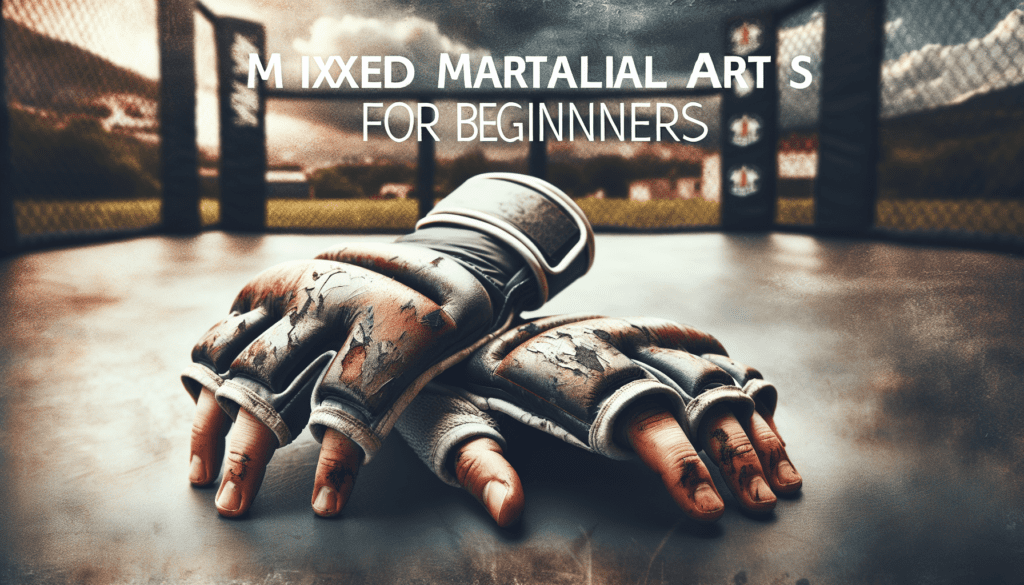If you’ve always been intrigued by the world of Mixed Martial Arts (MMA) but have no idea how to get started, fear not! This article will guide you through the initial steps on how to approach MMA training as a complete beginner. From finding the right gym and trainer to understanding the basic techniques and etiquette, you’ll gain valuable insight that will set you on the path to becoming a confident and skilled MMA fighter. So, get ready to embark on an exciting journey filled with discipline, perseverance, and the thrill of learning a new art form.
Choosing the Right Gym
When embarking on your MMA training journey as a complete beginner, one of the first and most crucial steps is to choose the right gym. A reputable gym will provide you with the necessary guidance, support, and resources to learn MMA effectively. Start by researching local gyms and their reputation in the MMA community. Look for gyms that have experienced coaches and trainers who have a successful track record in training fighters.
After your initial research, it’s important to visit different gyms and observe a class in action. Pay attention to the training atmosphere and the overall environment. Is it welcoming and inclusive? Do the coaches and trainers take the time to interact with each student individually? These factors can significantly impact your overall experience and progress in MMA.
Additionally, consider the facilities of the gym. Is the gym well-equipped with the necessary training equipment? Does it have ample space for classes and training sessions? Remember, a proper training environment can greatly enhance your learning and overall training experience.
Setting Realistic Goals
Once you have chosen the right gym, it’s time to set realistic goals for your MMA journey. Before setting goals, it’s essential to assess your current fitness level. Be honest with yourself and acknowledge your strengths and weaknesses. This will help you tailor your training plan and focus on areas that need improvement.
Define both short-term and long-term goals. Short-term goals can be achieved within a few months, while long-term goals may take years to accomplish. Short-term goals can include learning specific striking techniques or mastering certain grappling moves, while long-term goals can revolve around competing in amateur MMA competitions or even pursuing a professional fighting career.
Breaking down your goals into achievable steps is vital for maintaining motivation and progression. Instead of overwhelming yourself with the end result, focus on smaller milestones that you can regularly work towards. Celebrate each small victory along the way, as it will keep you motivated and make your MMA journey enjoyable.

Understanding the Basics of MMA
To excel in MMA, it’s important to have a solid understanding of its basics. Start by learning the different disciplines of MMA, such as striking (such as boxing, kickboxing, and Muay Thai) and grappling (such as Brazilian Jiu-Jitsu and wrestling). Familiarize yourself with the techniques, strategies, and principles of each discipline, as they form the foundation of MMA.
Alongside the disciplines, it’s crucial to understand the rules and regulations of MMA. This knowledge ensures that you train and compete within the defined boundaries of the sport. Familiarize yourself with the rules regarding striking, grappling, submissions, and other key aspects of MMA. This understanding will not only keep you safe but also ensure fair and ethical training and competition.
Lastly, devote time to familiarize yourself with common techniques used in MMA. Whether it’s punches, kicks, submissions, or takedowns, understanding the basic mechanics and execution of these techniques will lay the groundwork for your success in MMA.
Building a Solid Conditioning Base
To be successful in MMA, it’s essential to have a solid conditioning base. This involves incorporating various cardiovascular exercises into your training routine. Activities like running, swimming, and cycling improve your endurance, cardiovascular health, and overall stamina. These exercises mimic the demands of MMA fights and help you stay energized throughout training sessions and competitions.
In addition to cardio exercises, focus on building strength and flexibility. Engage in resistance training using weights or bodyweight exercises to develop functional strength that translates to your performance in MMA. Core strength, leg power, and upper body strength are particularly important. Additionally, prioritize stretching and mobility exercises to improve flexibility, joint health, and prevent injuries.
Remember, MMA is a multidimensional sport that requires a combination of strength, endurance, and flexibility. By incorporating cardio exercises, strength training, and flexibility work into your routine, you’ll build a solid conditioning base that will contribute to your overall success in MMA.

Mastering Fundamental Techniques
Once you have established a strong conditioning base, it’s time to focus on mastering fundamental techniques in MMA. Start by honing your stance and footwork. A proper stance forms the foundation for balance, power, and mobility in all aspects of MMA. Familiarize yourself with various stances and footwork drills to improve your agility and movement in the ring.
Effective striking techniques are crucial in MMA. Develop a solid understanding of punches, kicks, knees, and elbows. Practice proper form and technique to optimize your striking power and accuracy. Learn how to generate maximum force while maintaining proper balance and defensive abilities.
Grappling and submission moves are equally important. Understand the basics of takedowns, clinches, and ground fighting. Focus on learning fundamental submissions, such as chokes and joint locks, to gain control and submit opponents when the fight goes to the ground. Mastering these essential techniques will give you a well-rounded skill set in MMA.
Developing a Consistent Training Schedule
Consistency is key in MMA training. To maximize your progress, create a training schedule that fits your lifestyle and commitments. Evaluate your available time and determine how many training sessions you can realistically commit to each week. It’s important to strike a balance between training and other responsibilities to avoid burnout and maintain a sustainable routine.
Once you create a schedule, commit to attending regular training sessions. Consistency breeds progress, and showing up consistently reflects your dedication to improving in MMA. Treat your training sessions as non-negotiable appointments and prioritize them accordingly.
However, it’s equally important to balance training with rest and recovery. MMA training is physically and mentally demanding, and ample recovery time is essential for optimal performance. Listen to your body’s signals and allow for enough rest between training sessions to avoid overtraining and injuries. Rest, sleep, and recovery strategies, such as massage or stretching, should be incorporated into your training routine to aid in muscle repair and overall well-being.
Working with Knowledgeable Coaches and Trainers
One of the most valuable aspects of MMA training is the guidance and expertise of experienced coaches and trainers. Seek out reputable coaches who have a deep understanding and knowledge of MMA. Their expertise will provide you with proper technical instruction, motivation, and personalized training plans.
When working with coaches, don’t hesitate to ask for personalized training plans that align with your goals and current abilities. Individualized training plans will help you progress at your own pace and address specific areas of improvement. Coaches can tailor drills, exercises, and strategies to cater to your needs, ensuring optimal growth and performance.
Remember, coaches are there to guide you, so be open and receptive to their feedback. Apply their advice and constructive criticism to enhance your skills and overcome any challenges you may face. Embrace the opportunity to learn from their experience and utilize their knowledge to become the best MMA fighter you can be.
Building Mental Strength and Resilience
MMA is not just a physical battle; it’s also a mental one. Developing mental strength and resilience is crucial for success in the sport. Practice visualization techniques to imagine yourself performing at your best during training and competitions. Visualize your goals and see yourself achieving them. This mental exercise can enhance focus, confidence, and overall performance.
Managing fear and adrenaline is another skill to develop. MMA often elicits strong emotions and physical reactions, and learning to control and channel these emotions will help you stay calm and focused during fights. Techniques such as deep breathing and positive self-talk can help you manage fear and adrenaline effectively.
Lastly, embrace a mindset of continuous learning. MMA is an evolving sport, and there is always something new to learn. Stay curious, seek knowledge, and be open to learning from your experiences and those around you. This growth mindset will contribute to your long-term development as an MMA fighter.
Implementing Proper Nutrition and Recovery
To optimize your performance, proper nutrition and recovery strategies are paramount. Fuel your body with a balanced diet that includes a mix of protein, carbohydrates, and healthy fats. Protein is essential for muscle repair and growth, while carbohydrates provide energy for intense training sessions. Incorporate plenty of fruits and vegetables for essential vitamins and minerals.
Stay hydrated before, during, and after training. Proper hydration is crucial for overall health, performance, and recovery. Water helps regulate body temperature, supports nutrient transport, and aids in muscle function. Make it a habit to drink water throughout the day, especially during training sessions.
Rest, sleep, and recovery are equally important as training itself. Prioritize quality sleep to allow your body to repair and recharge. Implement recovery strategies such as foam rolling, stretching, and massages to aid in muscle recovery and prevent injuries. Remember, proper nutrition and recovery are integral components of your overall MMA training program.
Participating in Gradual Sparring and Competitions
As you progress in your MMA journey, engaging in controlled and supervised sparring sessions can be beneficial. Sparring allows you to practice your techniques in a simulated fighting environment, helping you refine your skills and develop your fighting instincts. Start with low-intensity, controlled sparring sessions and gradually increase the intensity and complexity as you gain confidence and skill.
In addition to sparring, consider participating in amateur competitions to gain experience and test your skills. Amateur competitions provide a platform to apply your training in a competitive setting. Treat these competitions as learning opportunities, regardless of the outcome. Observe and learn from your performance, identify areas for improvement, and continue to refine your skills based on the feedback you receive.
Remember, MMA is a journey, and progress takes time. Embrace the process, stay committed to your training, and enjoy every step along the way. With the right mindset, dedication, and perseverance, you can achieve your goals and become proficient in the exciting world of MMA.

